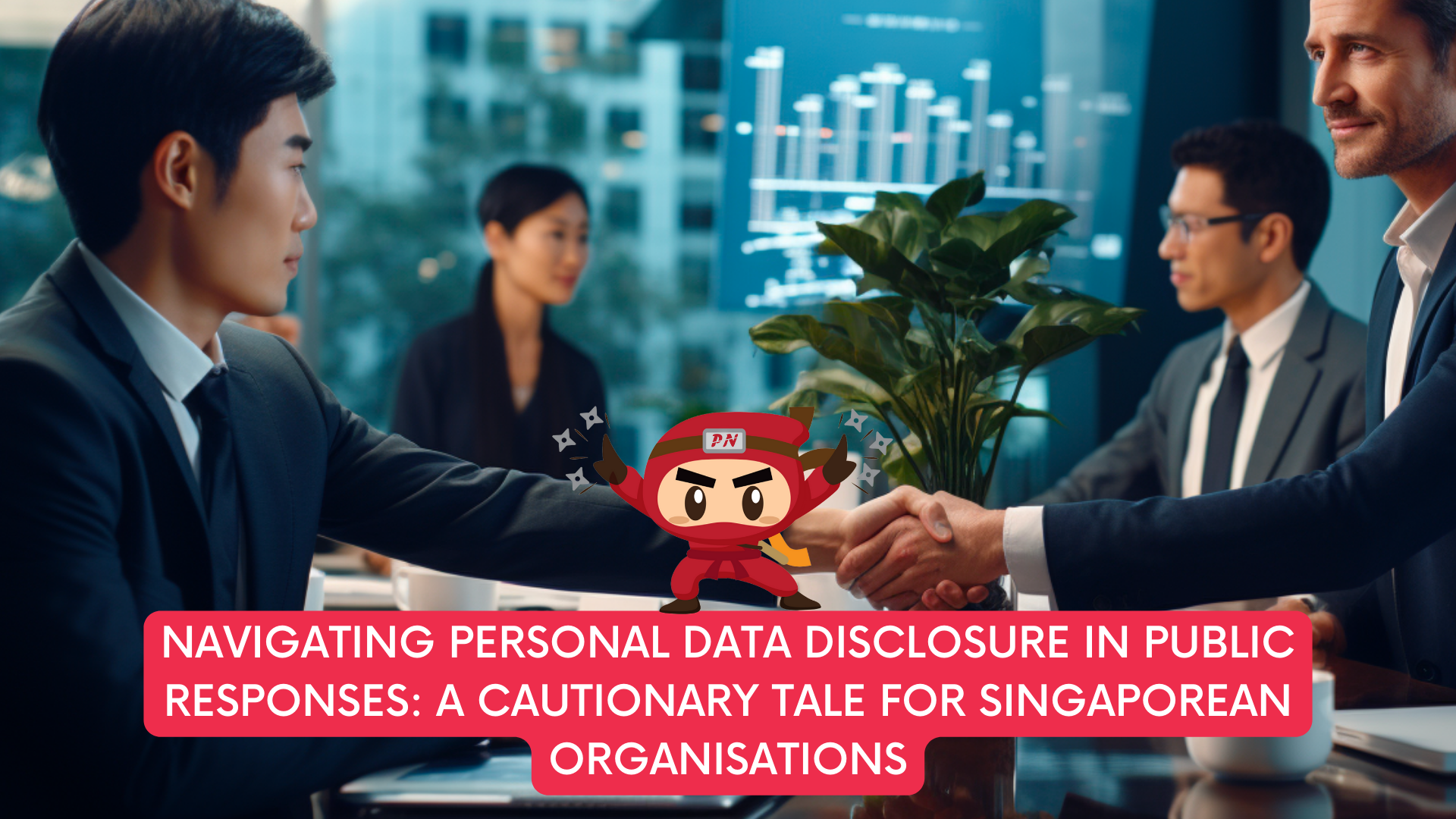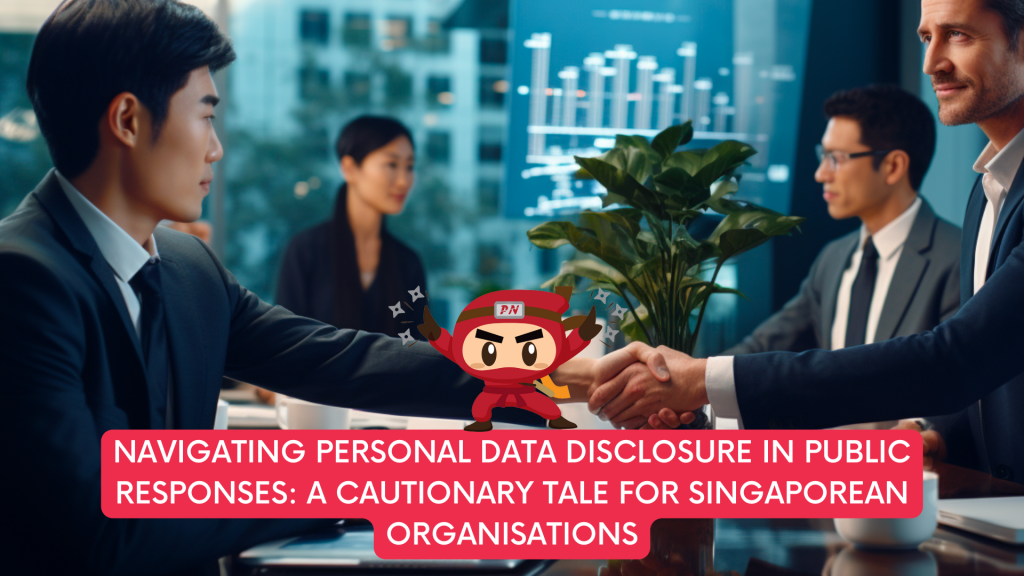KEEP IN TOUCH
Subscribe to our mailing list to get free tips on Data Protection and Cybersecurity updates weekly!







In the digital age, where online interactions and public discourse are integral to organizational presence, the handling of personal data in response to public comments is a delicate balancing act.
Organizations in Singapore, bound by data protection regulations, must exercise caution when considering the disclosure of personal data. This practice should be approached with prudence, reserving such disclosures for situations where it is not only reasonable but necessary to advance a transparent explanation.
Singapore’s commitment to data protection is evident in its robust regulatory framework, with the Personal Data Protection Act (PDPA) serving as the cornerstone. The PDPA establishes guidelines for the collection, use, and disclosure of personal data by organizations. When it comes to responding to public comments, organizations need to align their practices with the principles laid out in the PDPA.
Under the PDPA, organizations are required to obtain consent for the collection, use, and disclosure of personal data. The disclosure of personal data in response to public comments should be approached cautiously, ensuring compliance with these consent requirements. Consent should be obtained unless the disclosure falls under specific exceptions outlined in the PDPA.
Central to responsible data handling is the principle of reasonableness. Organizations must assess the reasonableness of disclosing personal data in response to public comments. This assessment involves weighing the necessity and appropriateness of such disclosure against the potential impact on the individual’s privacy.
Reasonable disclosure may be warranted in situations where transparency is crucial for addressing public concerns, providing accurate information, or correcting misinformation. However, the onus is on organizations to demonstrate that the disclosure is justified by the circumstances. Overly broad or unnecessary disclosure may not only violate privacy principles but also erode trust and confidence.
The disclosure of personal data in response to public comments should be driven by the need to advance transparent explanations. Transparency builds trust and fosters a positive relationship between organizations and the public. When faced with public inquiries or concerns, organizations should carefully consider whether disclosing personal data contributes to a more transparent and comprehensive explanation.
In cases where personal data is directly relevant to the issue at hand, providing additional context may be necessary. This can help dispel misunderstandings, correct inaccuracies, and ensure that the public has a more informed perspective. However, organizations must exercise discretion, avoiding unnecessary or excessive disclosures that could compromise privacy.

The disclosure of personal data in response to public comments comes with inherent risks, and organizations must take proactive measures to mitigate these risks. An essential aspect of risk mitigation is implementing robust data protection policies and practices. These policies should include clear guidelines on when and how personal data can be disclosed in public responses.
Organizations should also invest in employee training to ensure that individuals responsible for responding to public comments are well-versed in data protection principles. This includes understanding the criteria for reasonable disclosure, obtaining consent when required, and recognizing situations where personal data should not be disclosed.
Striking a balance between privacy protection and public engagement is a nuanced challenge. Organizations must navigate this terrain by adopting a privacy-by-design approach. This involves integrating privacy considerations into the development of public engagement strategies, response protocols, and communication practices.
By considering privacy implications from the outset, organizations can develop responsive and responsible approaches to public comments. This may involve anonymizing data where possible, seeking alternative means to address public concerns, or providing aggregated information instead of individualized details. The goal is to engage with the public effectively while upholding privacy standards.
In the digital era, where public perception can be shaped by online interactions, building and maintaining public trust is paramount. Responsible handling of personal data in response to public comments is a crucial component of this trust-building process. Organizations that demonstrate a commitment to privacy, transparency, and ethical data practices are more likely to garner public support and confidence.
Building public trust involves not only complying with legal requirements but also going above and beyond to protect individuals’ privacy rights. This can be achieved through proactive communication about data handling practices, clear explanations regarding the necessity of any disclosures, and a commitment to continuous improvement in privacy safeguards.

In conclusion, the disclosure of personal data in response to public comments is a delicate matter that demands careful consideration from organizations in Singapore. Navigating the regulatory landscape, understanding the principle of reasonableness, and advancing transparent explanations are essential components of responsible data handling.
Organizations must prioritize privacy protection while engaging with the public, ensuring that any disclosure of personal data is justified by the circumstances and aligns with the principles of the Personal Data Protection Act. By striking a balance between privacy and public engagement, organizations can build and maintain public trust in the digital age, fostering positive relationships with their audiences while upholding the highest standards of data protection.
Your appointed DPO can work with you on your PDPA compliance, ensuring that there will be policies in place to make sure that the handling of personal data is PDPA compliant.
A Data Protection Officer (DPO) oversees data protection responsibilities and ensures that organisations comply with the Personal Data Protection Act (PDPA). Furthermore, every Organisation’s DPO should be able to curb any instances of PDPA noncompliance as it is the officer responsible for maintaining the positive posture of an organisation’s cybersecurity.
DPOs complement organisations’ efforts to ensure that the organisation’s methods of collecting personal data comply with the PDPA. It also ensures that policies are set in place to make sure that there will be no instances of data breaches in the future.
Don’t wait any longer to ensure your organisation is PDPA compliant. Take our free 3-minute PDPA Compliance Self-audit checklist now, the same “secret weapon” used by our clients to keep them on track. Upon completion, we will send you the results so you can take the necessary action to protect your customers’ data. Complete the free assessment checklist today and take the first step towards protecting your customers’ personal data.